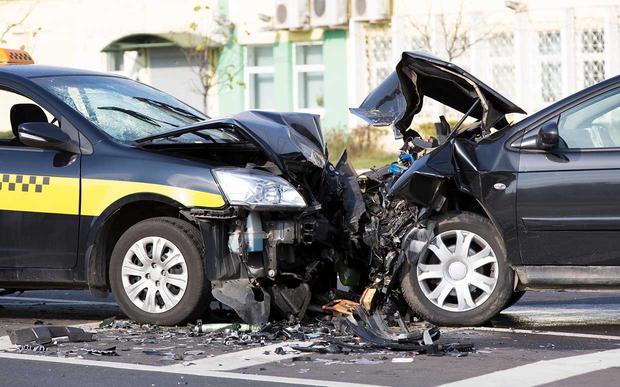collision
Explanation
Thephenomenonthattwoobjectsinrelativemotioncontactandquicklychangetheirmotionstate.Itcanbethecollisionofmacroscopicobjects,suchastamping,forging,hittingtheball,etc.,orthecollisionofmicroscopicparticlessuchasatoms,nuclei,andsubatomicparticles.Inclassicalmechanics,thedirectcollisionoftwoballsisusuallystudied,thatis,therelativespeedisexactlyonthelineofthecenterofthesphere.Becausethecollisionprocessisveryshort,theimpulsebetweenthecollidingobjectsisfargreaterthantheforcegiventothembythesurroundingobjects,andtheeffectofthelattercanbeignored.Thesystemcomposedofthesetwoobjectscanberegardedasanisolatedsystem.Momentumandenergyareconserved,butmechanicalenergyisnotnecessarilyconserved.Iftheelasticityofthetwoballsisverygood,thepotentialenergystoredduetodeformationduringthecollisioncanbecompletelyconvertedintokineticenergyduringseparation,andthereisnolossofmechanicalenergy.Itiscalledacompletelyelasticcollision,andthecollisionofthesteelballisclosetothissituation.Ifitisacollisionbetweenplasticballs,thedeformationcannotberecoveredatall.Afterthecollision,thetwoballsmoveatthesamespeed,andalargepartofthemechanicalenergyisconvertedintointernalenergythroughinternalfriction.Thisiscalledacompletelyinelasticcollision,suchasthecollisionofamudballorawaxball.Impactpendulumalsobelongstothiscategory.Theonebetweenthetwo,thatis,thetwoballsonlypartiallyreturntotheiroriginalstatewhentheyareseparated,whichiscalledanincompleteelasticcollision,andthelossofmechanicalenergyisbetweentheabovetwotypesofcollisions.Collisionbetweenmicroscopicparticles,suchasonlytheexchangeofkineticenergywithoutchangesinthetype,numberorinternalmotionstateoftheparticles,iscalledelasticcollisionorelasticscattering;suchasnotonlytheexchangeofkineticenergy,butalsothetransitionofparticleenergystateorthegenerationofparticlesAndannihilationiscalledinelasticcollisionorinelasticscattering.Inparticlephysics,informationabouttheinteractionbetweenparticlescanbeobtained,whichisaveryimportantresearchtopic.
Thecollisionprocesstimeisextremelyshort,sotheinternalforceisalwaysgreaterthantheexternalforce,andthemomentummustbeconserved.
(1)Collisionisgenerallydividedintotwoprocesses:compressionphaseandrecoveryphase.
(2)Collisioncanbedividedintothefollowingcategories:completelyelasticcollision,completelyinelasticcollisionandincompleteelasticcollision.
Energyconversionincollision
Inthecompressionphase,thekineticenergyoftheobjectisconvertedintootherformsofenergy,andintherecoveryphase,otherformsofenergyareconvertedintokineticenergy.
Inafullyelasticcollision,thetotalkineticenergydoesnotchangebeforeandafterthecollision.
Collisionisclassifiedbyenergyangle
Idealelasticcollision
Whentwoobjectscollidewitheachother,theenergyisnotconvertedintointernalenergy(suchasheatordeformation).Accordingtothefirstlawofthermodynamics,thesumofkineticenergybeforecollisionisequaltothesumofkineticenergyaftercollision.Inthelawofconservationofmomentum,thesumofmomentum(vector)beforecollisionisalsoequaltothesumofmomentumaftercollision.
Theidealelasticcollisionisaphysicalmodelinthemacroscopicview.Duetofrictionandotherfactors,thesystemalwaysloseskineticenergy.Relatedmodelssuchasbilliardballsandrubberballs.


Inthecollisionbetweenatomsandelementaryparticles,thereisaminimumenergyaccordingtoquantummechanics.Thisminimumenergyprovidesimpetusforatomsorotherparticles,orprovidesnecessaryconditionsforcreatingandtransformingparticlesinquantumphysics.Thisenergyisstillnotenoughforanidealelasticcollision.
Accordingtothefirstlawofthermodynamics,thesumofmomentumbeforeandafterthecollisionmustbeequal.
Thedirectionofmomentumcannotbeignored,becausethevectorsumisalargevalueinn-dimensionalspace(n>1).Thesquareofthevectorisregardedasascalarinthelawofconservationofenergy.Therefore,pleasenotethatthevelocityandthecollisiondirectioninthefollowingformulaarethesame(tangent),ratherthanintersecting.
Inthetwo-dimensionalormulti-dimensionalspace,thecollisionmustbedisassembledandanalyzedbasedonthecollisionangle.
Inelasticcollision
In"inelasticcollision",partofthekineticenergyisconvertedintointernalenergy(U).Whenanobjectdeformsorheatsupinacollision,thecollisioniscalled"inelastic."Inelasticcollisionssatisfytheconservationofmomentum,butnottheconservationofmechanicalenergy(partiallyconvertedintointernalenergy).
Completelyinelasticcollision
Inacompletelyinelasticcollision,thereisnoreboundatallafterthecollision,andasmuchkineticenergyaspossibleispartiallyconvertedintointernalenergy,thenthekineticenergyinthiscollisionsystemThebiggestloss.Therefore,thetwosubstances"stick"togetherafterthecollisionandcontinuetoflyatthesamespeed.Forexample,twoplasticineballssticktoeachotheraftercollisionandcontinuetomoveatthesamespeed.
Superelasticcollision
Inasuperelasticcollision,theinternalenergytransformsmorethanthekineticenergyofatleastonecollider.Itskineticenergyafterthecollisionisgreaterthanitskineticenergybeforethecollision.Themathematicalexpressionisthesameasthegeneraldescriptionofinelasticcollision,whichisU<0.
Collisionisclassifiedbycollisionangle
Directimpact(directimpact)
Amovingballcollideswithastationaryball.Thespeedoftheballbeforethecollisionisonthesamelineasthelineconnectingthecentersofthetwoballs.Afterthecollision,thespeedofthetwoballswillstillfollowthisline.Thiskindofcollisioniscalledpositivecollision,alsocalledcentercollision.
Obliqueimpact(obliqueimpact)
Ifamovingballcollideswithastationaryball,ifthespeedoftheballbeforethecollisionisnotonthesamelineasthelineconnectingthecentersofthetwoballs,Afterthecollision,thespeedofthetwoballswilldeviatefromtheoriginallineofthecentersofthetwoballs.Thiscollisioniscalledobliquecollision,alsocalledoff-centercollision.
Thecollisionofanobjectagainstanobstacle
Thecollisionofanobjectagainstafixedobjectsuchasthegroundorawallbelongstothistype,anditcanalsobedividedintoafrontalcollisionandanobliquecollision.
Collisionoftheobjecttotherotatableobject
WhentheobjectAcollideswiththeobjectBthatcanrotatearoundtheOaxis,theobjectBsuddenlyacquiresanangularvelocitychange(Figure4).Generally,acollisionreactionforceisimmediatelygeneratedatthesupportOofB,anditsmagnitudeisrelatedtothepositionofthecollisionaction,thatis,thedistanceOO1.However,underspecialconditions,althoughthesuspendedobjectissubjecttoimpact,itsbindingforcecanstillbezero.
Othertypesofcollisions
Scattering
Inparticlephysics,atomicphysics,orwhenaphotonisusedasoneofthecollisionobjects,collisionisalsocalledscattering,dissipationordiffusion.Whenaparticletransitionstoanotherenergylevelinacollision,itisalsocalledaninelasticcollision(inelasticscattering).Whenmostphotonsparticipateinaninelasticscattering,theirtotalwavelengthwillchange.ForrelatedpleaserefertoScatteringandScatteringPrinciples.
Reactioncollision
Reactioncollisioncomesfromreaction,suchaschemicalreactionorthecollisionofhigh-energyparticlesinquantumphysicstoproducenewparticles.Itmustbenotedherethatdifferentparticlesbeforeandafterthecollisionprovideenergyandmomentum.Duringthecollision,thespeedchangesatthesametimetherearechangesinthemassandquantityofparticles.
Atypeofreactioncollisionsuchas"electronegativeexchange":theatomicphysicsprocessoftheexchangeofoneatom,moleculeorion,oneormoreelectrons.Itispossiblethatduringthisprocessanelectrongivespositivechargetooneofthecollisionobjects.Forexample,positronsinthesolarwind(seehigh-energyions)arecapturedandemitx-rayswhentheypassthroughtheatmospherearoundthecomet.
Applicationofcollision
Usethehugecollisionforcegeneratedduringcollisiontogeneratehugeinstantaneousforce,suchasvariouspunchingmachines,piledrivers,shellpiercing,etc.Onthecontrary,sometimestoavoidthehazardofhugecollisionforce,variousbufferdevices,suchaselasticbodiesorhydraulicshockabsorbers,areusedtoprolongthecollisiontimeandreducethecollisionforce.Collisionhasbecomeanimportantmechanicalprobleminmodernengineeringtechnology.Thehugecollisionforceandcontinuouscollisionhaveagreatinfluenceonthestrengthandfatigueofthematerial.Inaddition,instruments,devicesandequipmentshouldensurethattheycanworknormallywhentheircarriersaresubjectedtocollisionsandimpactloads,withoutloosening,malfunctioningordamage.
References
1.Theauthoroftheentry:GaoWeibing."ChinaEncyclopedia"Volume74(FirstEdition)MechanicsEntry:Collision:ChinaEncyclopediaPublishingHouse,1987:379-380pages.
Latest: Priori probability
Next: number







